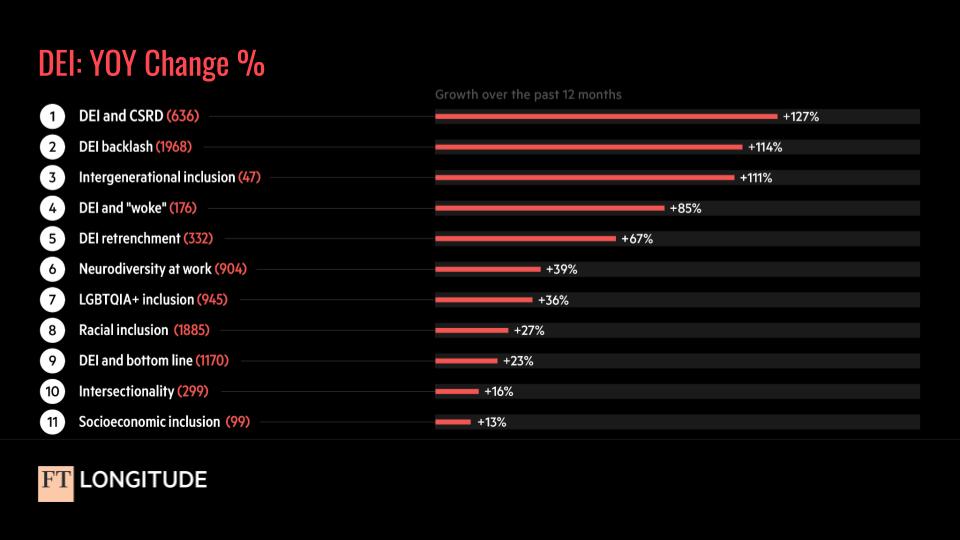The DEI paradox:
navigating backlash and progress in 2025
Diversity, equity, and inclusion are at a crossroads. Learn how to address backlash while driving meaningful progress in your thought leadership strategy.

The DEI paradox: resistance, evolution, and the future of work
Diversity, equity, and inclusion (DEI) is no longer just an ethical imperative; it is a strategic business priority. As organisations navigate the complexities of the future of work, DEI is emerging as a critical driver of resilience, innovation, and employee engagement. Yet, the conversation is far from straightforward.
During our “Thought leadership for the evolving people agenda” event, experts explored the paradox of backlash and progress shaping DEI in 2025. While resistance and retrenchment are increasing, many organisations are simultaneously expanding and deepening their DEI strategies, creating both challenges and opportunities for leaders.
The backlash against DEI
DEI has become a focal point in cultural debates, especially in regions experiencing heightened political polarisation. In the US, the term “woke” has been weaponised, fuelling scepticism and opposition to DEI initiatives. Similar dynamics are emerging in Europe, where political shifts and populist movements are amplifying resistance to inclusive practices. For example, high-profile organisations like Coca-Cola have faced public backlash, underscoring the need for thoughtful, authentic approaches to DEI.
Media scrutiny reflects this tension. Mentions of DEI in mainstream discourse have increased tenfold over the past five years, with a 60% rise in the last year alone. However, this increased visibility has brought DEI strategies into the spotlight, often as points of contention in broader societal debates. For CHROs, the challenge lies in maintaining momentum while navigating a polarised landscape.

Future of Work media topic trends analysis, December 2024
The business case remains strong
Despite resistance, the business case for DEI remains compelling. Studies consistently show that inclusive organisations outperform their peers in financial performance, employee engagement, and innovation. Regulatory developments, such as the European Corporate Sustainability Reporting Directive (CSRD), further emphasise the importance of DEI transparency and accountability. Companies that scale back on DEI efforts risk not only regulatory scrutiny but also falling behind competitors who embrace inclusive practices.
The evolving workplace of the future demands that DEI strategies are not perceived as zero-sum initiatives that benefit only specific groups. Instead, organisations must articulate the universal benefits of DEI, fostering shared value across the workforce. This requires showcasing data-driven evidence that connects DEI success to tangible outcomes, such as employee satisfaction, productivity, and revenue growth.
Opportunities for thought leadership
As the DEI conversation evolves, organisations are presented with unique opportunities to lead impactful, forward-looking discussions:
Elevate the evidence base: Counter misconceptions about DEI with robust, data-driven insights. Demonstrating the clear links between inclusive strategies and business outcomes can help shift the narrative from scepticism to value creation.
Highlight emerging dimensions: The future of DEI lies in its growing nuance. Intersectionality, neurodiversity, intergenerational inclusion, and socio-economic diversity are gaining prominence. For example, recognising neurodivergent talent and fostering socio-economic inclusion provide avenues for organisations to innovate and engage meaningfully with employees.
Engage authentically: Thoughtful DEI strategies require collaboration with diverse voices within and beyond the organisation. Employee stories, leadership perspectives, and external partnerships can help craft authentic narratives that resonate broadly.
Guidance for CHROs: uniting organisations around DEI
The politicisation of DEI places additional pressure on CHROs to demonstrate both its human and business value. While navigating resistance, CHROs must focus on building inclusive environments that benefit the entire workforce. Prioritising initiatives that foster unity and shared purpose is critical to mitigating the perception of DEI as divisive.
To achieve this, organisations should:
Leverage employee networks: These groups can provide valuable insights into the real challenges employees face, helping to shape authentic, impactful DEI strategies.
Focus on flexibility: As the workforce becomes increasingly diverse, organisations must implement flexible policies that accommodate the needs of employees across different intersections of identity.
Adopt real-time feedback tools: Continuous feedback enables leaders to monitor the impact of DEI initiatives and address concerns before they escalate.
Looking ahead: DEI and the future of work
The future of work will be defined by organisations that embrace complexity and lead with inclusion. While backlash and resistance pose real challenges, the evolving DEI agenda offers opportunities to drive innovation, resilience, and growth. By elevating evidence, engaging authentically, and addressing emerging dimensions of inclusion, leaders can position DEI not as a divisive concept but as a cornerstone of sustainable success in an ever-changing workplace.
In this paradox of resistance and evolution, thought leadership will be essential. The organisations that navigate this space with courage, clarity, and authenticity will not only shape the future of DEI but also set the standard for the future of work itself.
Join our upcoming webinar to hear from industry leaders as we unpack the DEI paradox and share proven successful strategies for your thought leadership. Register today to stay ahead in 2025. Register here.
Sign up to the newsletter
We help organisations stand out, speak with authority and spark inspiration, so change can happen. That’s real intelligence with influence. Sign up to our newsletter to get regular updates.
Subscribe






 Back
Back

 Book a meeting
Book a meeting
 Book a meeting
Book a meeting

